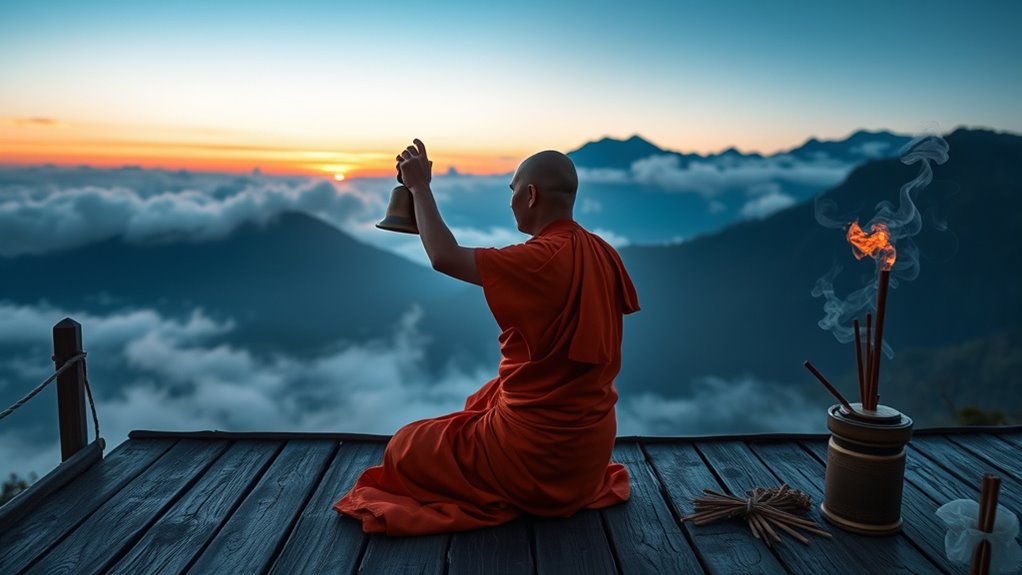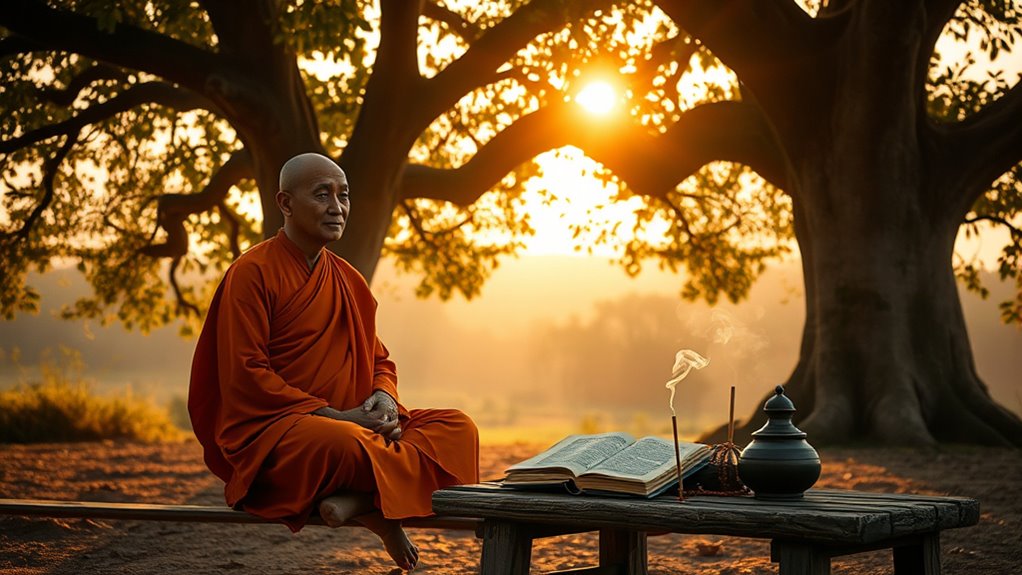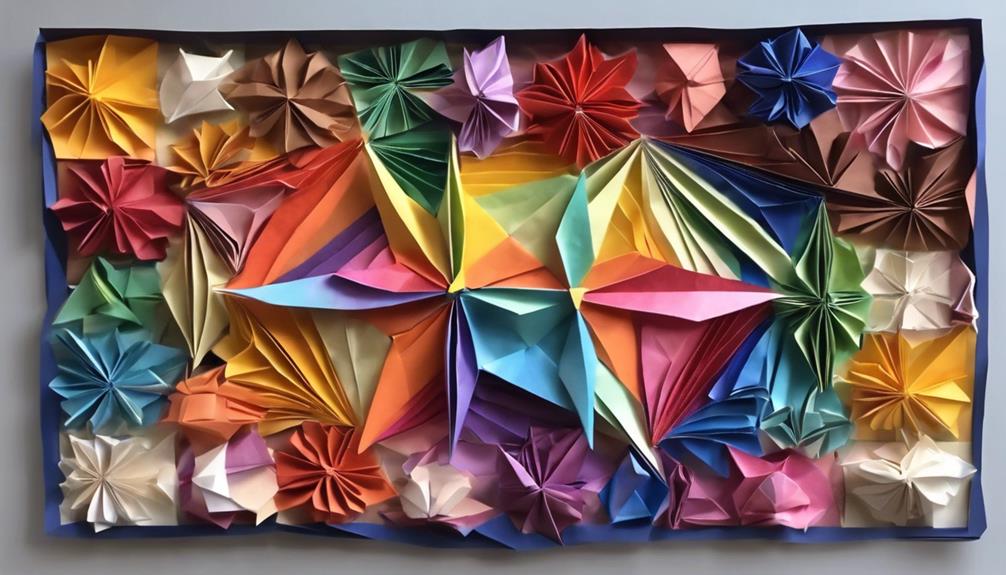Daily rituals from world wisdom traditions help you connect with your inner self and cultural roots through simple, meaningful acts. Whether lighting candles, praying, or practicing mindfulness with nature walks, these routines symbolize deeper values and foster inner peace. They serve as a deliberate pause amid life’s chaos, offering resilience and spiritual harmony. To discover how these practices can enrich your daily life, explore further steps you can take.
Key Takeaways
- Daily rituals connect individuals to spiritual roots and cultural traditions, fostering mindfulness and inner peace.
- Practices like prayer, meditation, lighting candles, and incense serve as symbolic acts of devotion and reflection.
- Incorporating natural elements and gestures enhances rituals’ spiritual significance across diverse cultures.
- Rituals transform ordinary routines into meaningful expressions of values, strengthening spiritual and emotional resilience.
- Consistent daily practices help create sacred space within, promoting mindfulness, gratitude, and inner harmony.

Across cultures and centuries, daily rituals have served as essential practices that connect individuals to their spiritual roots, foster mindfulness, and promote inner peace. These rituals often incorporate mindfulness practices that ground you in the present moment, helping you cultivate awareness beyond everyday distractions. Whether it’s a morning prayer, meditation, or simple acts like lighting a candle, each ritual becomes a deliberate pause—a way to center yourself amid life’s chaos. Ritual symbolism plays a crucial role here; objects, gestures, and words carry deeper meanings that reinforce your spiritual intentions. For example, lighting incense in Asian traditions symbolizes purification and the ascent of prayers to the divine, while in Western practices, crossing yourself may serve as a reminder of faith and protection. Such symbols are not mere gestures but gateways to a heightened sense of connection and purpose.
Daily rituals connect us to our spiritual roots, fostering mindfulness and purpose through meaningful symbols and simple acts.
When you adopt daily rituals rooted in world wisdom traditions, you begin to see them as more than routines—they become meaningful expressions of your values and beliefs. In many Eastern philosophies, like Buddhism and Hinduism, mindfulness practices are integrated into daily activities, turning ordinary moments into opportunities for spiritual growth. You might start your day with a mindful breathing exercise, paying close attention to each inhale and exhale, allowing you to set a calm tone for the hours ahead. The act of washing your hands or preparing a meal can be transformed into a ritual that emphasizes gratitude and presence, reinforcing the idea that your daily actions are sacred. These small but consistent acts serve as anchors, reminding you to stay connected to the present. Additionally, the cybersecurity vulnerabilities experienced during digital disruptions highlight the importance of creating resilient routines that safeguard your digital and spiritual well-being.
In indigenous traditions, ritual symbolism often involves natural elements—stones, plants, or water—that embody spiritual significance and connect you to the earth. Incorporating such symbols into your daily routine can deepen your sense of harmony with the environment and your inner self. For instance, a morning walk in nature, paying attention to the textures and sounds around you, acts as a mindfulness practice that nurtures your soul. Similarly, in Christian and Jewish traditions, lighting candles at specific times signifies remembrance and hope, transforming simple acts into profound expressions of faith. When you recognize the symbolic meaning behind these rituals, they become more than habits—they turn into intentional acts of devotion and reflection.
Ultimately, daily rituals from world wisdom traditions serve as a bridge between your outer actions and inner consciousness. They remind you that mindfulness practices and ritual symbolism aren’t just for special occasions but are essential tools to nurture your spiritual well-being each day. These routines help you create a sacred space within, fostering a sense of peace, resilience, and purpose that sustains you through life’s challenges.
Frequently Asked Questions
How Can I Adapt These Rituals to a Busy Schedule?
When figuring out how to fit rituals into your busy schedule, focus on time management and flexibility tips. You can adapt practices by shortening meditation sessions or doing quick gratitude exercises during breaks. Prioritize rituals that resonate most, and be creative with timing—like practicing mindfulness during commutes or meals. Staying flexible helps you maintain consistency without feeling overwhelmed, making these meaningful traditions easier to incorporate into your daily life.
Are These Rituals Suitable for Children or Beginners?
You might think these rituals aren’t suitable for children or beginners, but with child-friendly adaptations and beginner-friendly practices, anyone can participate. You can simplify meditation, use fun activities, or incorporate short, engaging practices into daily routines. These modifications make it easier for kids and newcomers to connect with the traditions, helping them build meaningful habits without feeling overwhelmed. So yes, these rituals can be accessible and beneficial for all ages.
What Are Common Challenges in Maintaining Daily Rituals?
You might find maintaining daily rituals challenging due to inconsistent routine or losing sight of their spiritual significance. Ritual consistency can be tough when life gets busy, making it easy to skip or rush through practices. To stay committed, remind yourself of the deep spiritual meaning behind each ritual. Overcoming these challenges requires perseverance, setting realistic expectations, and creating a dedicated space that helps reinforce the importance of your daily spiritual practice.
How Do Cultural Differences Influence Ritual Practices?
You’ll notice that cultural differences deeply influence ritual practices through cultural symbolism and spiritual significance. These elements shape how rituals are performed, their meaning, and their importance within communities. You may find that different cultures emphasize unique symbols or spiritual concepts, guiding your understanding and participation. Recognizing these differences helps you appreciate diverse traditions, fostering respect and deeper connections with the spiritual practices rooted in each culture’s worldview.
Can These Rituals Be Combined With Modern Wellness Routines?
You can definitely combine these rituals with modern wellness routines by focusing on modern integration and personalization. Customize practices to fit your lifestyle, blending traditional wisdom with current habits. This approach helps you create a meaningful routine that resonates personally, making rituals more effective and sustainable. By adapting and integrating, you honor cultural roots while enhancing your overall well-being, ensuring a balanced, enriching daily practice tailored just for you.
Conclusion
By incorporating daily rituals from around the world, you can bring more mindfulness, balance, and purpose into your life. These traditions remind you that small, consistent actions can create profound change. So, why not embrace these timeless practices and see how they transform your day? After all, isn’t life about finding meaning in the little moments? Start today, and let these wisdoms guide you toward a more centered, fulfilled existence.









